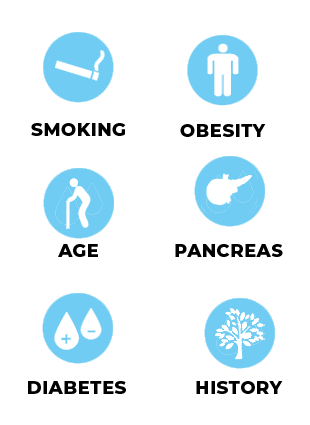While pancreatic cancer is one of the rarer types of cancer, the American Cancer Society estimates that about 49,830 people in the United States will die from the disease in 2022. To help raise awareness about pancreatic cancer and drive donations for pancreatic cancer research, the month of November is recognized each year as Pancreatic Cancer Awareness Month.
At Bikham Healthcare, we wanted to take this opportunity to shine a spotlight on pancreatic cancer and Pancreatic Cancer Awareness Month. Below, we will cover everything you need to know about pancreatic cancer, symptoms of pancreatic cancer, key pancreatic cancer statistics, and more.
What is Pancreatic Cancer?
Before we explain pancreatic cancer, it may first be helpful to define what the pancreas is and the role that it plays in the human body. The pancreas is a pear or leaf-shaped organ that is about six inches long and located underneath the liver close to the stomach and gallbladder. It is responsible for releasing hormones, including insulin, to help the body process sugar from the foods that you eat.
Pancreatic cancer, meanwhile, occurs when the cells in the pancreas develop mutations in their DNA. These mutations cause the cells to grow uncontrollably, forming a tumor. Cancerous pancreatic cells can also spread throughout the body to other organs.
Symptoms of Pancreatic Cancer
One of the challenges of diagnosing and treating pancreatic cancer is the fact that pancreatic cancer symptoms often don’t show up until the disease is advanced. This leaves routine screenings as the only reliable way to catch pancreatic cancer in its early stages while the disease is still highly curable.
With that said, it’s still important to understand pancreatic cancer symptoms. According to the Mayo Clinic, common pancreatic cancer symptoms include:

- Abdominal pain that radiates to the back
- Loss of appetite or unintentional weight loss
- Jaundice, or yellowing of the skin/whites of the eyes
- Itchy skin
- Blood clots
- Fatigue
- Dark-colored urine
- Light-colored stools
- New diagnosis of diabetes or existing diabetes that’s becoming more difficult to control
If you are experiencing any of these symptoms or any other symptoms that concern you, be sure to see your doctor right away.
Pancreatic Cancer Risk Factors

The exact cause of pancreatic cancer is still largely unknown. However, researchers have identified numerous risk factors thought to make a person more prone to developing the disease. This includes risk factors such as:
- Smoking
- Diabetes
- Chronic inflammation of the pancreas
- Obesity
- Family history of pancreatic cancer
- Age
- Family history of genetic syndromes that can increase cancer risk
Risk factors for pancreatic cancer such as age and family history are going to be outside of your control. However, there are things that you can do to reduce other pancreatic cancer risk factors. If you smoke, try to stop; 25% of pancreatic cancers are thought to be caused by smoking, and people who smoke are about twice as likely to develop pancreatic cancer as those who have never smoked.
How to Reduce Your Pancreatic Cancer Risk
Maintaining a healthy weight is also key to reducing your pancreatic cancer risk. People who are obese (defined as having a body mass index of 30 or higher) are about 20% more likely to develop pancreatic cancer. In fact, carrying extra weight around the waistline is thought to be a risk factor for pancreatic cancer even among people who are not obese according to BMI. Maintaining a healthy weight by eating a nutritious diet and getting plenty of exercise is key to reducing the risk of numerous types of cancer, including pancreatic cancer.
Chronic pancreatitis, defined as long-term inflammation of the pancreas, is linked with pancreatic cancer as well. Heavy alcohol consumption is one thing that can cause chronic pancreatitis and thus increase pancreatic cancer risk.
Finally, it’s thought that heavy exposure to certain industrial chemicals used in the dry cleaning and metal working industries may increase pancreatic cancer risk. While you may or may not be able to limit your exposure to these chemicals depending on your chosen career, this is a risk factor that can be controlled.
At Bikham Healthcare, we want all of our readers to stay as healthy and risk-free as possible. This Pancreatic Cancer Awareness Month, be sure that you are making lifestyle choices that will reduce your pancreatic cancer risk.




